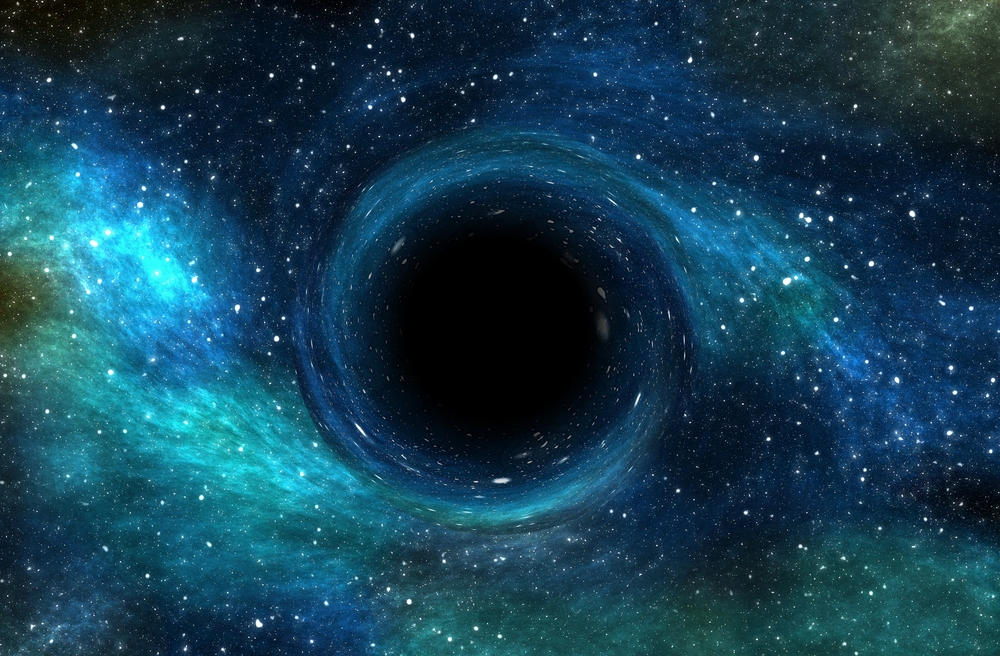
Black holes have both fascinated and baffled humanity for decades. As these formidable entities devour everything around them, their properties and behavior pose new challenges in how to understand them. While astrophysicists gather information and develop new theories, astrologers also puzzle over these strange objects. Do black holes matter in astrology, and what do they mean in your birth chart? The answers to these questions depend on who you ask.
What Are Black Holes?
English clergyman and scholar Rev. John Michell suggested in 1784 that some celestial bodies may have gravitational fields so strong that light could not escape. He called these bodies “dark stars.” Albert Einstein published his general theory of relativity in 1915, proposing that the fabric of space-time changes when affected by gravity, matter, energy, and momentum. Logically, intense gravitational forces could warp space-time in significant ways.
So what happens when you have extraordinarily dense gravity at a specific point in space-time? Kurzgesagt’s short film on black holes explains that stars remain in equilibrium when their cores produce enough radiation from nuclear fusion to roughly equal gravitational forces. After exhausting their fuel supplies, they implode, condense, and then explode in supernovae. Depending on these stars’ properties, extreme gravity collapses them into either neutron stars or black holes.
A New Discovery in April 2019
Although Einstein and several other scientists developed black hole theories in the early 20th century, the term “black hole” wasn’t coined until 1967. The first possible proof of their existence was identified after X-ray surveys in 1971. But when the first visual image of a black hole was revealed in April 2019, it made headlines around the world. Like a blurred cat’s eye in the darkness of space, this mesmerizing image proved that the theoretical was indeed physical. Astrology.com’s Leona Moon adds that the black hole, named Virgo A, is located in the Messier 87 galaxy within the Virgo constellation.
Astrology’s Take on Black Holes
Writing for Elle, AstroStyle founders Tali and Ophira Edut mention a key astrological concept: “As above, so below.” In other words, activity and characteristics in the heavens are correspondingly linked to trends on Earth. But since astrologers adopt unique approaches, the Edut twins call black hole astrology an “interpretive dance” taking on a wide range of meanings.
Well+Good’s Erin Hanafy discusses some of these divergent meanings. Astrologer Alex Miller believes that they represent intense magnetism, inescapable events, or inevitable sudden change that creates new realities. At AstroStyle, the Edut twins link them to strong forces that impact us: innate gifts, patterns that are difficult to resist, or addictions. Other astrologers regard black holes as aspects we’re drawn to because we feel they’re missing or want more of them in our lives. Even the supermassive black hole at our galactic center holds a special meaning: the liminal space between life, death, and the afterlife.
Black holes may not be represented in your birth chart, but you can still discern whether there are any present. Virgo A is currently moving towards 1° Libra, and Alex Miller lists the zodiac sign locations of other known black holes. Planets, objects, and even natal Suns within three degrees of black holes can exert huge impacts on one’s personality. A black hole Sun, for instance, could signal an insecure sense of self and an intense need to affirm one’s identity. Conjunctions, oppositions, and squares between planets and black holes produce more prominent effects.
Astrology’s Dark Stars
As our astronomical knowledge expands, astrology has kept pace. Celestial objects that were unknown to our ancestors are now part of modern astrological methodologies. The same is now true for black holes. Those mysterious entities that consume light and matter hold an unusual sway, lending intensity to our planets’ and suns’ energies.

